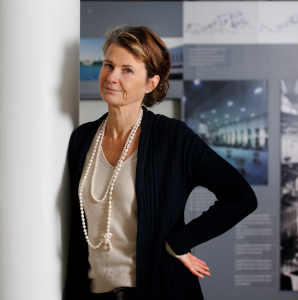 Sara Heinämaa is Professor of Philosophy at the University of Jyväskylä, Finland. She specializes in phenomenology, existentialism, philosophy of mind and history of philosophy, and has published extensively in these fields, especially on mental capacities, artificial intelligence, embodiment, personhood and intersubjectivity. She is an expert of Husserlian phenomenology but has also contributed broadly to our understanding of existential phenomenology and its methods, especially the philosophies of Merleau-Ponty, Beauvoir, Sartre and Levinas. Heinämaa is co-author of Birth, Death, and Femininity (2010) and author of Toward a Phenomenology of Sexual Difference (2003), and has co-edited several volumes, including Contemporary Phenomenologies of Normativity: Norms, Goals, Values (2022), Why Method Matters: Phenomenology as Critique (2022), Phenomenology and the Transcendental (2014), and Consciousness (2007).
Sara Heinämaa is Professor of Philosophy at the University of Jyväskylä, Finland. She specializes in phenomenology, existentialism, philosophy of mind and history of philosophy, and has published extensively in these fields, especially on mental capacities, artificial intelligence, embodiment, personhood and intersubjectivity. She is an expert of Husserlian phenomenology but has also contributed broadly to our understanding of existential phenomenology and its methods, especially the philosophies of Merleau-Ponty, Beauvoir, Sartre and Levinas. Heinämaa is co-author of Birth, Death, and Femininity (2010) and author of Toward a Phenomenology of Sexual Difference (2003), and has co-edited several volumes, including Contemporary Phenomenologies of Normativity: Norms, Goals, Values (2022), Why Method Matters: Phenomenology as Critique (2022), Phenomenology and the Transcendental (2014), and Consciousness (2007).
 David Ekdahl is a philosopher and qualitative researcher. His main research areas are embodiment and virtuality. He is also engaged in the ongoing issue of how to integrate philosophical phenomenology with empirical research. Between 2017-2021, funded by the Danish Ministry of Culture, Ekdahl has worked with high-ranking esports practitioners in order to illuminate the significance of the body to specialized comportment in virtual spaces. From 2022 to 2023, funded by the Carlsberg Foundation, he will be responsible for the research project ‘Shelter from the Norm’, exploring the significance of online spaces to autistic people. As of 2023, Ekdahl is an Assistant Professor at Aarhus University. Ekdahl’s research has been presented across the public sphere, including on national television and before the Danish Parliament.
David Ekdahl is a philosopher and qualitative researcher. His main research areas are embodiment and virtuality. He is also engaged in the ongoing issue of how to integrate philosophical phenomenology with empirical research. Between 2017-2021, funded by the Danish Ministry of Culture, Ekdahl has worked with high-ranking esports practitioners in order to illuminate the significance of the body to specialized comportment in virtual spaces. From 2022 to 2023, funded by the Carlsberg Foundation, he will be responsible for the research project ‘Shelter from the Norm’, exploring the significance of online spaces to autistic people. As of 2023, Ekdahl is an Assistant Professor at Aarhus University. Ekdahl’s research has been presented across the public sphere, including on national television and before the Danish Parliament.
 Olli Tapio Leino is a computer game studies and philosophy of computer games scholar focusing on materiality, experience, emotion, interpretation, and performance in computer games and playable art. Leino has completed multiple funded projects on topics such as existential ludology, game hermeneutics, electronic sports, and gamification and is currently working on a project on gameplay and/as performance. His publications include an article on the technological specificity and playful practice in Mahjong, published in Games & Culture (2017), an article on the neoliberalist underpinnings of computer games in Journal of Gaming & Virtual Worlds (2016) translated to German in 2022, a chapter on romantic attraction to computer game characters in the Game Love anthology (2015), a chapter on ontology of gameplay in Springer anthology Philosophy of Computer Games (2012), an article on the technological specificity of single-player computer games in Game Studies (2011) translated into Polish in 2017 and into Chinese in 2020, and a paper on computer game worlds translated (2013) into Brazilian Portuguese in 2019. Leino has also written about human/technology relations in new media art, and curated the ‘New Playable Art’ exhibition for IFVA’14 at Hong Kong Arts Centre. His research has been featured in Radio and Television Hong Kong (RTHK), South China Morning Post (SCMP), Television Broadcasts Ltd. (TVB), Scripps News, and BBC Radio 5.
Olli Tapio Leino is a computer game studies and philosophy of computer games scholar focusing on materiality, experience, emotion, interpretation, and performance in computer games and playable art. Leino has completed multiple funded projects on topics such as existential ludology, game hermeneutics, electronic sports, and gamification and is currently working on a project on gameplay and/as performance. His publications include an article on the technological specificity and playful practice in Mahjong, published in Games & Culture (2017), an article on the neoliberalist underpinnings of computer games in Journal of Gaming & Virtual Worlds (2016) translated to German in 2022, a chapter on romantic attraction to computer game characters in the Game Love anthology (2015), a chapter on ontology of gameplay in Springer anthology Philosophy of Computer Games (2012), an article on the technological specificity of single-player computer games in Game Studies (2011) translated into Polish in 2017 and into Chinese in 2020, and a paper on computer game worlds translated (2013) into Brazilian Portuguese in 2019. Leino has also written about human/technology relations in new media art, and curated the ‘New Playable Art’ exhibition for IFVA’14 at Hong Kong Arts Centre. His research has been featured in Radio and Television Hong Kong (RTHK), South China Morning Post (SCMP), Television Broadcasts Ltd. (TVB), Scripps News, and BBC Radio 5.
 Tom Poljanšek is a philosopher and German scholar currently involved in a research project exploring ‘Immersion as a Fundamental Aspect of Human Experience’ that integrates phenomenological, aesthetic, and empirical research. His research interests encompass phenomenology, philosophy of technology, aesthetics, and ontology. Since April 2019, he has been an assistant at the Department of Philosophy at the University of Göttingen, specializing in Theoretical Philosophy. In addition to several papers on immersion, phenomenology, human-machine interaction, and aesthetics, he published his dissertation “Realität und Wirklichkeit. Zur Ontologie geteilter Welten” (eng. “Reality and Worlds of Appearance: On the Ontology of Shared Worlds”) in 2022 and co-edited the Springer anthology “Emotional Machines: Perspectives from Affective Computing and Emotional Human-Machine Interaction” (2023).
Tom Poljanšek is a philosopher and German scholar currently involved in a research project exploring ‘Immersion as a Fundamental Aspect of Human Experience’ that integrates phenomenological, aesthetic, and empirical research. His research interests encompass phenomenology, philosophy of technology, aesthetics, and ontology. Since April 2019, he has been an assistant at the Department of Philosophy at the University of Göttingen, specializing in Theoretical Philosophy. In addition to several papers on immersion, phenomenology, human-machine interaction, and aesthetics, he published his dissertation “Realität und Wirklichkeit. Zur Ontologie geteilter Welten” (eng. “Reality and Worlds of Appearance: On the Ontology of Shared Worlds”) in 2022 and co-edited the Springer anthology “Emotional Machines: Perspectives from Affective Computing and Emotional Human-Machine Interaction” (2023).